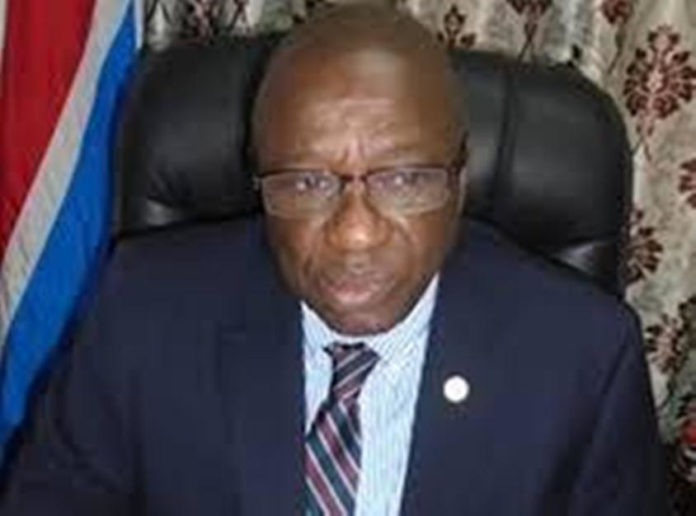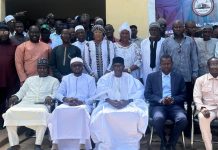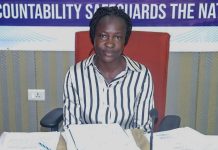By Awa B. Bah
The Minister of Transport, Works and Infrastructure Bai Lamin Jobe was engaged by Deputies at the National Assembly, to shed light on his plans to provide effective and efficient public transport services for the Gambia.
The Minister who appeared before NAMs on Thursday June 13th at the Second Ordinary Session of the National Assembly in the 2019 legislative year, said his Ministry is exploring the possibility of merging the ferry, river and bus services into a new entity. This new entity, he said, will have three business units, that is bus, ferry and river operations, and possibly rail operations in the future.
The proposed new entity he said, is envisaged to be instituted through Public Private Partnership (PPP) so as to attract joint Public and Private Investment (PPI). This approach, the Minister noted, will integrate and facilitate mass movement of people, goods and services on land and water; that the Ministry of Works is in the process of finalizing a cabinet paper in this regard.
On which institution is the custodian of the funds generated from the weighing station located between Banjul and Denton Bridge, Minister Jobe said that his Ministry signed a contract with Afri-Pesage in August 2017, to install and operate ten weigh bridges in the country; that eight will be fixed and two mobiles. This, he said, is to regulate and enforce the weight of trucks plying on the country’s roads for the obvious reasons of enhancing their service life and reducing maintenance costs; that it is agreed Afri-Passage shall incur all investment costs to construct and equip the facilities and in return, shall receive a proportional share of 80% of overload fees, whilst Government shall receive 20% of the revenue during the contract period of three years. The agreement he said, is in line with the new transport policy to control and manage the movement of traffic on the national roads infrastructure, to avoid their deterioration. He said this is in line with the ECOWAS transport protocols for member countries to introduce axel load control and penalties, in order to preserve the regional network.
On total funds disbursed to the regional Government for the inauguration of the Senegambia Bridge, Minister Jobe responded that a stakeholder committee was constituted to organize the Senegambia bridge inauguration; that the committee decided to decentralize the funds received was meant for feeding and transportation of invited guests from various regions in the country; that BCC, KMC, WCR, CRR and URR, were each given D250,000 while the host regions NBR and LRR, each received D500,000.
On Banjul, president Adama Barrow once presided over an official ceremony for the construction of Banjul roads, drainage and sewage system, a development that Members welcome after raising many concerns regarding the deplorable state of streets, drainages and sewerage in the capital city.
According to the Member for Banjul North Ousman Sillah, it was indicated that this is a US $35.6 million dollar project which will be implemented through pre-financing. Minister Jobe was challenged to disclose who is responsible for the pre-financing of this project; what is the contribution or quota of the central Government and the Banjul City Council, and the duration for implementation of the project.
Minister Jobe in response said because of the severe deplorable state of the capital city, the Ministry is fully supported by Government; that cabinet will fast-track the rehabilitation of the city within the next three years.
He said the Ministry proposed and cabinet approved the option of using Engineering, Procurement and Construction (EPC) contract arrangements, whereby the Ministry will consider proposals from reputable contractors willing to pre-finance the works by at least a year, after which Government will pay by installment.
The EPC arrangement, he said requires that Government hire an independent consultant to vet and approve the engineering drawings, bills of quantities and specifications proposed by the contractor, and generally to ensure that the delivered works have value for the money. The consultant, he said is in advanced discussion with his ministry to engage Studio Consultants of Tunisia, who were the consultants in Banjul-Barra Bridge, Sukuta/Jambanjelley road among several projects in the country.
The project he said, is allocated a budget which was determined by his Ministry to cover the cost of rehabilitating the entire drainage network of the city, the sewerage network and roads including Bundung road.
The Central Government through the Ministry of Finance and Economic Affairs he said, is fully committed to finance the project as outlined; that an important component is to assist BCC build its human resource and administrative capacity to manage the city after this investment. He said it is envisaged that this will include raising the revenue streams of the Council from property rates, port and ferries as well as the large number of commuters to the city from the KMC and WCR.
On his Ministry’s plans to ease traffic congestion of vehicles within the Serrekunda and Westfield due to the absence of a properly planned road network, the Minister in his response concurred that one of the key challenges of providing infrastructure and services to communities in the GBA and WCR, is the lack of adhering to Land use plans including transportation; that the provision of roads, drainage, water, electricity and communication, are not only complicated but unnecessarily costly.
The NRA he said, engages as a matter of routine with the KMC, in planning of upgrading or maintaining key roads within the municipality; that 250 kilometers of urban roads have been identified for intervention of which funds have been secured for 50 kilometers under the OIC project; that his Ministry has constituted a traffic management taskforce comprising key stakeholders, to propose relevant measures to improve traffic management within the GBA and WCR, as an amount included in the Ministry’s budget this year, to enable the work of the task force.




















